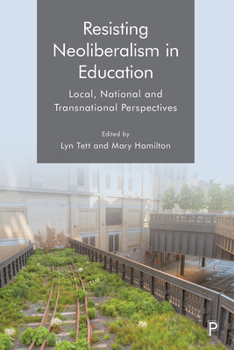Resisting Neoliberalism in Education: Local, National and Transnational Perspectives
Select Format
Select Condition 
Book Overview
Neoliberalism has been widely criticised because of its role in prioritising 'free markets' as the optimum way of solving problems and organising society. In the field of education, this leads to an emphasis on the knowledge economy that can reduce both persons and education to economic actors and be detrimental to wider social and ethical goals.
Drawing on a range of international contexts across informal, adult, school and university settings, this book provides innovative examples that show how neoliberalism in education can be challenged and changed at the local, national and transnational levels in order to foster a more democratic culture.
Format:Hardcover
Language:English
ISBN:1447350057
ISBN13:9781447350057
Release Date:September 2019
Publisher:Policy Press
Length:290 Pages
Weight:1.25 lbs.
Dimensions:0.9" x 6.5" x 9.3"
Customer Reviews
0 rating





